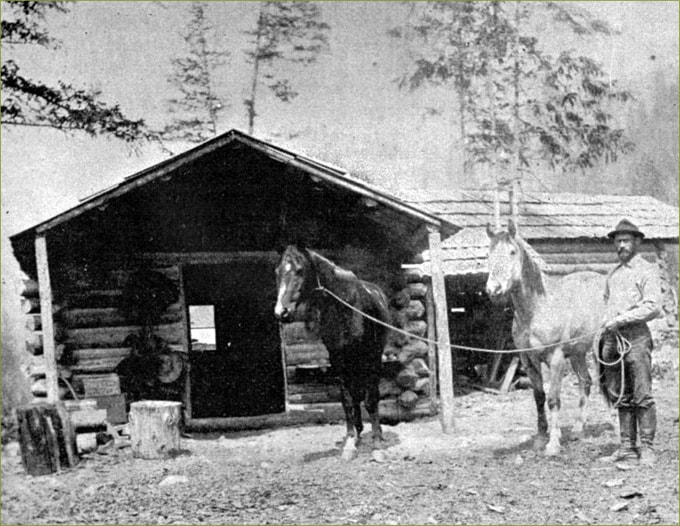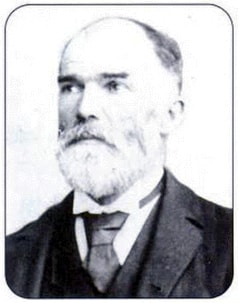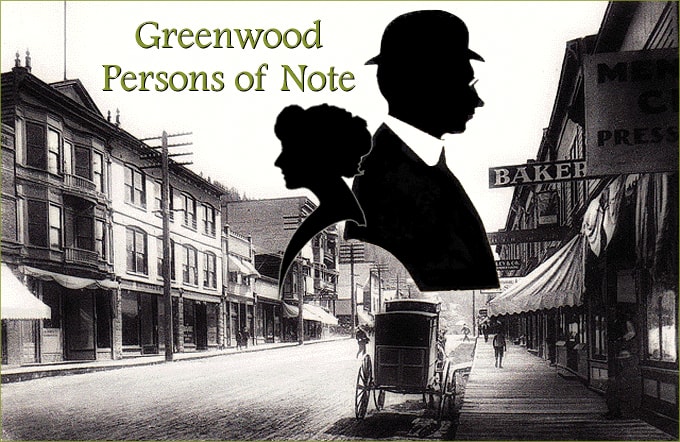BY: BG EDITOR
Sep 17, 2016 — GREENWOOD, BC (BG)
Today we begin a new series on some of the historical personalities who played an important role in Greenwood at the turn of the century. We'll begin with the most prominent -- our founder, Robert Wood.
Robert Wood established the town-site at Greenwood in 1895. Seeing the great potential of its fresh water and close proximity to local mining camps, he used his own money to build roads from mining camps to the town, helping Greenwood to become the economic center of the Boundary region.

'First Cabin in Greenwood', c. 1894
[Photo: BC Archives 193501-001 ]
The image above is thought to be Robert Wood [1] standing with horses in front of one of the earliest cabins to be built in Greenwood. Below is another image of Robert Wood; both photographs are shown in the book, Ghost Towns & Mining Camps of the Boundary Country by Garnet Basque (1999). In his book, Basque provides a detailed biography of Robert Wood. But there is another very interesting biographical sketch of Wood written in 1905, during his lifetime. Following is the 'who's who' listing for Robert Wood from the book, British Columbia from the Earliest Times to the Present, Volume III [2]:

Robert Wood
[Photo: BC Archives 193501-001 ]
ROBERT WOOD
"The town of Greenwood is a monument to the enterprise and business capacity of Robert Wood, its founder and one of its principal promoters. The upbuilding of this town and the development of the industrial facilities and resources of the surrounding country are what Mr. Wood regards
as the principal achievements of a very busy and interesting career.
Born in Walpole township, Haldimand county, Ontario, in 1841, a son of Rev. William and Rachel (Pugsley) Wood, both of whom are now deceased, he passed his boyhood and gained his education in the schools at Simcoe; but being of a restless disposition and a natural pioneer, he was always looking forward for the chance to explore the great west, and while yet a boy laid his books aside and suddenly started of with Alonzo Davis, an old forty-niner, for the placer excitement in Cariboo in the spring of 1862.
He was not as successful in mining ventures as he had anticipated, and in the fall of the same year left the mines and took up farming on the Fraser river below New Westminster. In 1882 he came to the Okanagan country and started a business at Landstown, but there his building was
destroyed by fire, at once, however, being rebuilt and his business continued with success. Later removing to Armstrong, he practically founded that town on his own ranch. In
1895, coming to the present site of Greenwood to investigate the outlook for mining and trading in this locality, he was very much impressed both by the resources of the mineral district and the natural advantages offered for a town site, and at once began the work of laying out a new town. This has been his home since that time.
The townsite is owned by the firm of R. Wood and Company, Mr. Wood having sold a large part of the land in the plot to C. Scott Galloway. Greenwood is now a substantial and prosperous town, with many improvements and advantages as a residence and business center, and its prosperity has in large measure been due to Mr. Wood's public-spirited enterprise.
He and a number of other citizens of Greenwood being owners of a lot of new mining property in the west fork of Kettle river, fifty miles west of Greenwood, it was evident to Mr. Wood that nothing could be done in developing the mining resources of this new district until transportation
was provided. After an ineffectual interview with the Canadian Pacific officials, who gave him no encouragement in the matter, he himself studied out a scheme for building a railroad from Vernon to Midway via West Fork, and after a careful examination of the field to be covered by the enterprise he became convinced of the vast benefit to all the country involved and especially to the new mining district. His determination to carry through his transportation scheme has never been weakened by difficulties, apathy or opposition, and he has worked first and last for its success, which at this writing is assured.
After his plans were formed he at once took a number of associates, obtained, in 1901, a charter and a bonus of four thousand dollars a mile, then, in 1902, a renewal of the charter with improved conditions and a subsidy of five thousand dollars per mile constructed, and succeeded in getting a Dominion charter and a subsidy of six thousand dollars a mile. After overcoming many difficulties and discouragements it is a matter of pride with Mr. Wood to state that at this date (August, 1905), the road is under construction and he is looking forward with merited pleasure to his first ride over the line and to seeing the first carload of ore hauled by this route to the Greenwood smelter. Mr.
Wood has been materially assisted in his many projects by the energy and business capacity of his wife, formerly Miss Margaret McLennan, of Port Rowan, Ontario. Mr. Wood is a member of the Masonic fraternity and of the Church of England. Influential in public affairs, he served as mayor for the first two terms after the founding of Greenwood, and is now a justice of the peace. He has given his influence to the steady and substantial development of Greenwood and vicinity, rather than endeavoring to "boom" the place in any way, and this economic policy has been most satisfactory to all concerned."
FOOTNOTES:
[1] Ghost Towns & Mining Camps of the Boundary Country by Garnet Basque, p. 58







